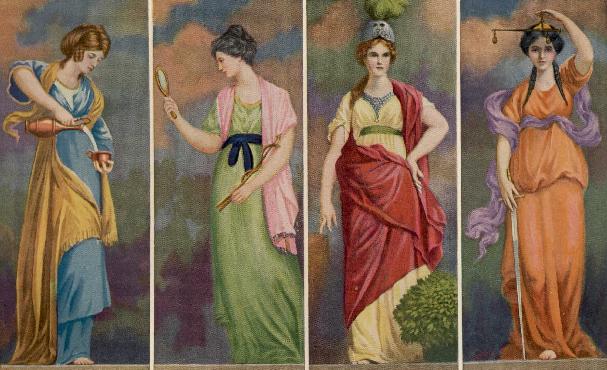
The Four Cardinal Virtues
Justice, Prudence, Temperance and Fortitude.
justice in the East, Prudence in the West, Temperance in the South and Fortitude in the North.`
Temperance - The Freemason who properly appreciates the secrets which he has solemnly promised never to revel, will not, by yielding to the unrestrained call of appetite, permit reason and judgment to lose their seats, and subject himself, by the indulgence in habits of excess, to discover that which should be concealed, and thus merit and receive the scorn and detestation of his Brethren. And lest any Brother should forget the danger to which he is exposed in the unguarded hours of dissipation, the virtue of temperance is wisely impressed upon his memory, by its reference to one of the most solemn portions of the ceremony of initiation. Some Freemasons, very properly condemning the vice of intemperance and abhorring its effects, have been unwisely led to confound temperance with total abstinence in a Masonic application, and resolutions have sometimes been proposed in Grand Lodges which declare the use of stimulating liquors in any quantity a Masonic offense. But the law of Freemasonry authorizes no such regulation. It leaves to every man the indulgence of his own tastes within due limits, and demands not abstinence, but only moderation and temperance, in anything not actually wrong.
Fortitude - instructs the worthy Freemason to bear the ills of life with becoming resignation, "taking up arms against a sea of trouble," but, by its intimate connection with a portion of our ceremonies, it teaches the candidate to let no dangers shake, no pains dissolve the inviolable fidelity he owes to the trusts reposed in him. Or, in the words of the old Prestonian lecture, it is "a fence or security against any attack that might be made upon him by force or otherwise, to extort from him any of our Royal Secrets."
Prudence - Preston first introduced it into the Entered Apprentice Degree as referring to what was then, and long before had been called the Four Principal Signs, but which are now known as the Perfect Points of Entrance. Preston's eulogium on prudence differs from that used in the lectures of the United States, which was composed by Webb. It is in these words: "Prudence is the true guide to human understanding, and consists in judging and determining with propriety what is to be said or done upon all our occasions, what dangers we should endeavor to avoid, and how to act in all our difficulties."
Justice - The Freemason who remembers how emphatically he has been charged to preserve an upright position in all his dealings with mankind, should never fail to act justly to himself, to his Brethren, and to the world. This is the corner-stone on which alone he can expect "to erect a superstructure alike honorable to himself and to the Fraternity." In iconology, the general science pertaining to images, Justice is usually represented as a matron, her eyes bandaged, holding in one hand a sword and in the other a pair of scales at equipoise. But in Freemasonry the true symbol of Justice, as illustrated in the First Degree, is the feet firmly planted on the ground, and the body upright.

